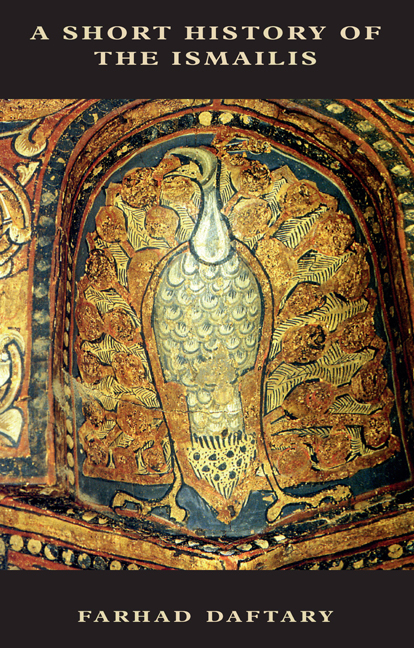Book contents
- Frontmatter
- Contents
- Preface
- Note on Transliteration, Dates and Abbreviations
- 1 Ismaili History and Historiography: Phases, Sources and Studies
- 2 Origins and Early History: Shī'īs, Ismailis and Qarmaṭīs
- 3 The Fatimid Age: Dawla and Da'wa
- 4 The Alamūt Period in Nizārī Ismaili History
- 5 Later Developments: Continuity and Modernisation
- Glossary
- Select Bibliography
- Index
2 - Origins and Early History: Shī'īs, Ismailis and Qarmaṭīs
Published online by Cambridge University Press: 24 September 2020
- Frontmatter
- Contents
- Preface
- Note on Transliteration, Dates and Abbreviations
- 1 Ismaili History and Historiography: Phases, Sources and Studies
- 2 Origins and Early History: Shī'īs, Ismailis and Qarmaṭīs
- 3 The Fatimid Age: Dawla and Da'wa
- 4 The Alamūt Period in Nizārī Ismaili History
- 5 Later Developments: Continuity and Modernisation
- Glossary
- Select Bibliography
- Index
Summary
The Prophet Muhammad laid the foundations of a new religion which was portrayed as the seal of the great revealed religions of the Abrahamic tradition. Thus, Islam from early on claimed to have completed and superseded the messages of Judaism and Christianity, whose adherents were accorded a special status among the Muslims as the “people of the book” (ahi al-kitāb). The unified and nascent Muslim community (umma) of the Prophet's time was, however, soon divided into numerous rival communities and groupings, as the Muslims now disagreed on a number of fundamental issues. The standard text of the Qur’an itself, the principal source of the sacred law of Islam (sharī'a) to which Muslims would turn for divine guidance, was not committed to writing for several decades after the death of the Prophet in 11/632, while the doctrinal positions of various Muslim communities were elaborated gradually over several centuries.
DIVERSITY IN EARLY ISLAM
Modern scholarship has indeed shown that the early Muslims lived, at least during the first three centuries of their history, in an intellectually dynamic and fluid milieu. The formative period of Islam was essentially characterised by a multiplicity of communities of interpretation and schools of thought, and a diversity of views on the major religio-political issues faced by the early Muslims. At the time, the Muslims were confronted by many gaps in their religious knowledge and understanding of Islam, revolving around issues such as the attributes of God, nature of authority, and definitions of true believers and sinners. It was under such circumstances that different religious communities and schools of thought formulated their doctrines in stages and gradually acquired their names and distinctive identities. In this intellectually effervescent ambience, in which ordinary individuals as well as theorists moved readily from one community to another, Muslims engaged in lively discourses on a variety of theological, juristic and political issues. In terms of political loyalties, which remained closely intertwined with theological perspectives, diversity in early Islam ranged widely from the stances of those, later designated as Sunnis, who endorsed the actual course of events, notably the historical caliphate and the authority-power structure that had actually evolved in the Muslim society, to various religio-political opposition communities, notably the Khawārij and the Shī'a, who aspired towards the establishment of new orders.
- Type
- Chapter
- Information
- A Short History of the IsmailisTraditions of a Muslim Community, pp. 21 - 62Publisher: Edinburgh University PressPrint publication year: 2020



